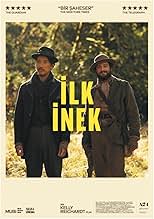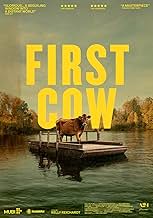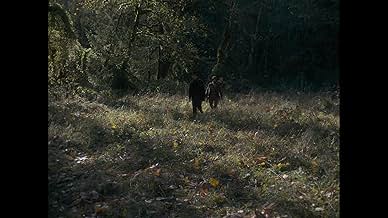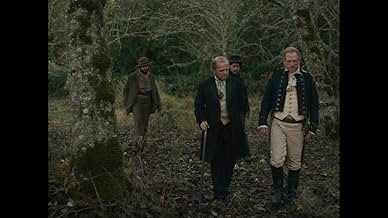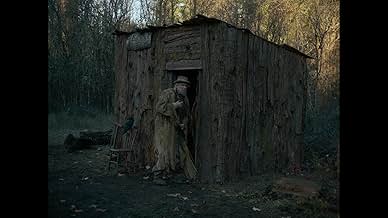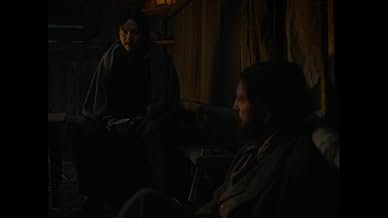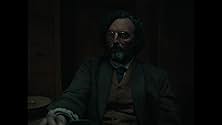AVALIAÇÃO DA IMDb
7,1/10
23 mil
SUA AVALIAÇÃO
Um cozinheiro habilidoso viajou para o oeste e se juntou a um grupo de caçadores de peles, ele só encontra uma conexão verdadeira com um imigrante chinês que também procura sua fortuna. Logo... Ler tudoUm cozinheiro habilidoso viajou para o oeste e se juntou a um grupo de caçadores de peles, ele só encontra uma conexão verdadeira com um imigrante chinês que também procura sua fortuna. Logo os dois colaboram em um negócio de sucesso.Um cozinheiro habilidoso viajou para o oeste e se juntou a um grupo de caçadores de peles, ele só encontra uma conexão verdadeira com um imigrante chinês que também procura sua fortuna. Logo os dois colaboram em um negócio de sucesso.
- Prêmios
- 28 vitórias e 157 indicações no total
Rene Auberjonois
- Man with Raven
- (as René Aubergenois)
Kevin Michael Moore
- Fort Trapper
- (as Kevin-Michael Moore)
Enredo
Você sabia?
- CuriosidadesOne of Rene Auberjonois's last 2 films released after his death in December 2019.
- Erros de gravaçãoCookie mentions he would like to have a business in San Francisco. The film is ostensibly set in the 1820s, when the city had not officially been named San Francisco. However, the name had been in use since the 1590s and could have been used at the time the film is set.
- Cenas durante ou pós-créditosThe Cow - Evie
- ConexõesFeatured in WatchMojo: Top 10 Movies of 2020 (So Far) (2020)
Avaliação em destaque
It may be because of how I watched this - First Cow and Reichardt's films in general call for seeing it in a cinema if at all possible, she simply has that eye and ear for the minutest details and for the time she takes with every shot and many scenes to draw out the feeling of a place as well as for the actors to settle in, that you want to sink in to this film as a sensory experience, and instead I saw it at home where (I don't know about you but) I have too many distractions, not least of which the phone on a busy weekday - but it took me about fifteen to twenty minutes or so to get into the mood of this film. I wasn't sure if it might go anywhere really, as it follows the Cookie character as he is part of this fur trapping outfit (or almost on the outside, just barely with it, but enough to be in it without, say, getting into scraps/fights like the others), and it was frankly slow-going.
But then the story, as much as it is, kicks in and it becomes this very simple tale of a friendship and what may be a fairly minor crime in the grand scheme of things - taking milk from a cow that isn't there's so they can make oily cakes, basically the 1820's rural Oregon equivalent of what I assume is Krispy Kreme - and how it gets tested and firms as they become more successful and gain the employ of the wealthiest man in the area (Toby Jones), who... also happens to own the cow that they've been milking. It's so engrossing because of its simplicity, the delicacy and yet the immediacy of the world that Reichardt has recreated for us. Like all the best period filmmakers, she and her collaborators bring this part of America/the Pacific North-west to life in almost a humble sort of way: it isn't ostentatious, it's just... what it was, and that makes it special.
Aside from the performances themselves from these two, I have to wonder if the power of this film comes from something that maybe Reichardt was conscious of or maybe she wasn't, but this story makes me think about filmmaking itself, especially of the independent kind (or art creation in general). You have to assemble the right ingredients, and it most often takes some tenacity for it to all come together like it should (and how many times have you heard of someone on an indie movie shoot "going guerilla" or "stealing a shot" from some such and such a location they didn't have a permit for, etc). It feels like a story that Reichardt has lived at some point in her life, and she gets to deepen on the themes she worked in on Old Joy, also about a male friendship that gets tested by cirumstance.
And what's fascinating is how because of the slow-burn-ness of the pacing, by the time it gets to the last half hour or final quarter, it has some real suspense as we wonder how our two great lawbreakers will get out of this as they get hunted down. It's not quite to the same level of poetic grungy-frontier depiction heights as a McCabe & Mrs. Miller, but it has that same looseness and understanding about humanity, and if anything is less pessimistic about equality between people of different backgrounds and races. What happens after the end credits start to roll? I don't know, and I don't need to is the point - they've gotten through some s***, and they're together.
But then the story, as much as it is, kicks in and it becomes this very simple tale of a friendship and what may be a fairly minor crime in the grand scheme of things - taking milk from a cow that isn't there's so they can make oily cakes, basically the 1820's rural Oregon equivalent of what I assume is Krispy Kreme - and how it gets tested and firms as they become more successful and gain the employ of the wealthiest man in the area (Toby Jones), who... also happens to own the cow that they've been milking. It's so engrossing because of its simplicity, the delicacy and yet the immediacy of the world that Reichardt has recreated for us. Like all the best period filmmakers, she and her collaborators bring this part of America/the Pacific North-west to life in almost a humble sort of way: it isn't ostentatious, it's just... what it was, and that makes it special.
Aside from the performances themselves from these two, I have to wonder if the power of this film comes from something that maybe Reichardt was conscious of or maybe she wasn't, but this story makes me think about filmmaking itself, especially of the independent kind (or art creation in general). You have to assemble the right ingredients, and it most often takes some tenacity for it to all come together like it should (and how many times have you heard of someone on an indie movie shoot "going guerilla" or "stealing a shot" from some such and such a location they didn't have a permit for, etc). It feels like a story that Reichardt has lived at some point in her life, and she gets to deepen on the themes she worked in on Old Joy, also about a male friendship that gets tested by cirumstance.
And what's fascinating is how because of the slow-burn-ness of the pacing, by the time it gets to the last half hour or final quarter, it has some real suspense as we wonder how our two great lawbreakers will get out of this as they get hunted down. It's not quite to the same level of poetic grungy-frontier depiction heights as a McCabe & Mrs. Miller, but it has that same looseness and understanding about humanity, and if anything is less pessimistic about equality between people of different backgrounds and races. What happens after the end credits start to roll? I don't know, and I don't need to is the point - they've gotten through some s***, and they're together.
- Quinoa1984
- 27 de ago. de 2020
- Link permanente
Principais escolhas
Faça login para avaliar e ver a lista de recomendações personalizadas
Detalhes
- Data de lançamento
- País de origem
- Central de atendimento oficial
- Idiomas
- Também conhecido como
- First Cow
- Locações de filme
- Empresas de produção
- Consulte mais créditos da empresa na IMDbPro
Bilheteria
- Faturamento bruto nos EUA e Canadá
- US$ 101.068
- Fim de semana de estreia nos EUA e Canadá
- US$ 81.323
- 8 de mar. de 2020
- Faturamento bruto mundial
- US$ 1.386.609
- Tempo de duração2 horas 2 minutos
- Cor
- Proporção
- 1.37 : 1
Contribua para esta página
Sugerir uma alteração ou adicionar conteúdo ausente

Principal brecha
What is the streaming release date of First Cow - A Primeira Vaca da América (2019) in Brazil?
Responda




